Unit 3 Faster,Higher,Stronger Lesson 7 Time to Exercise课件(32张)
文档属性
| 名称 | Unit 3 Faster,Higher,Stronger Lesson 7 Time to Exercise课件(32张) |
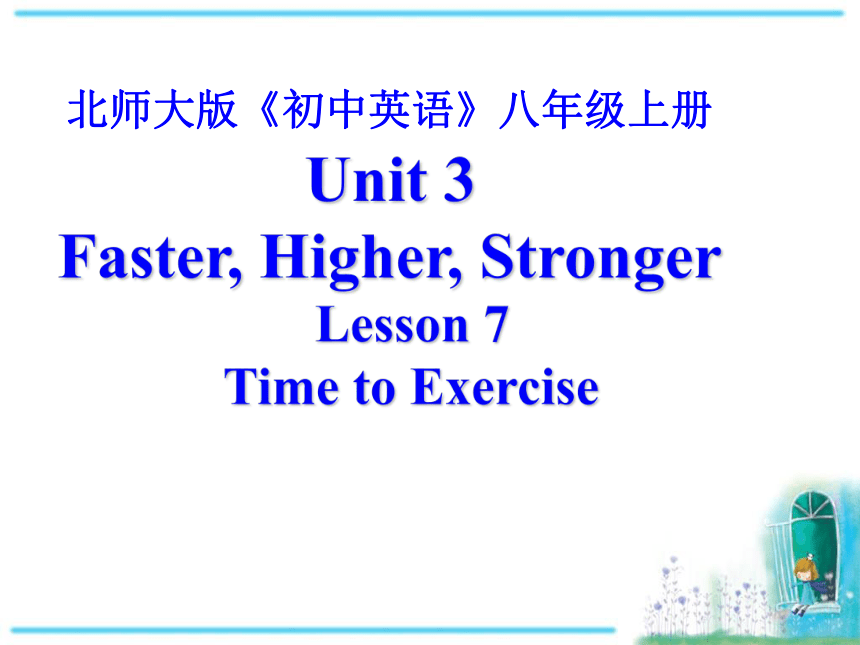
|
|
| 格式 | zip | ||
| 文件大小 | 9.0MB | ||
| 资源类型 | 教案 | ||
| 版本资源 | 北师大版 | ||
| 科目 | 英语 | ||
| 更新时间 | 2018-12-09 00:00:00 | ||
图片预览

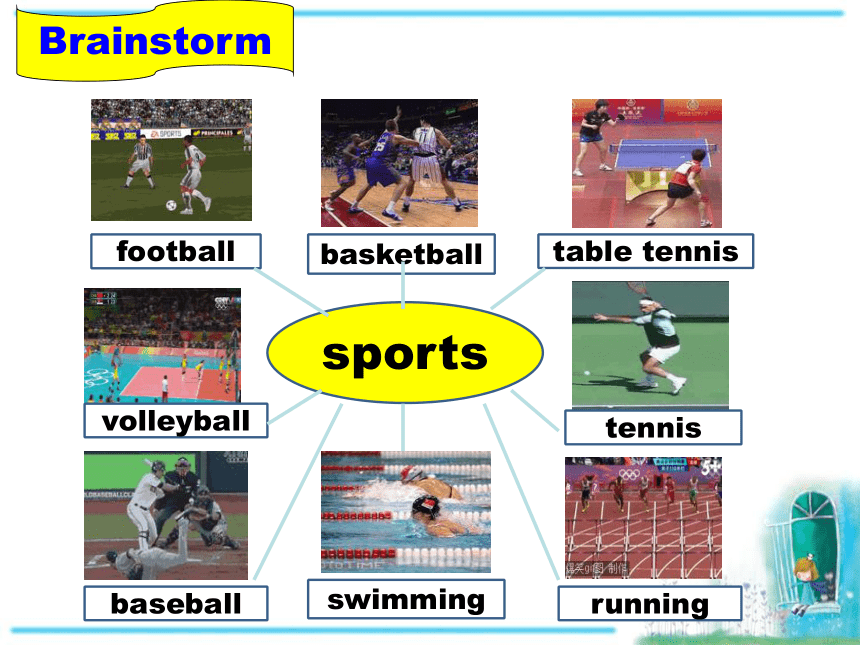

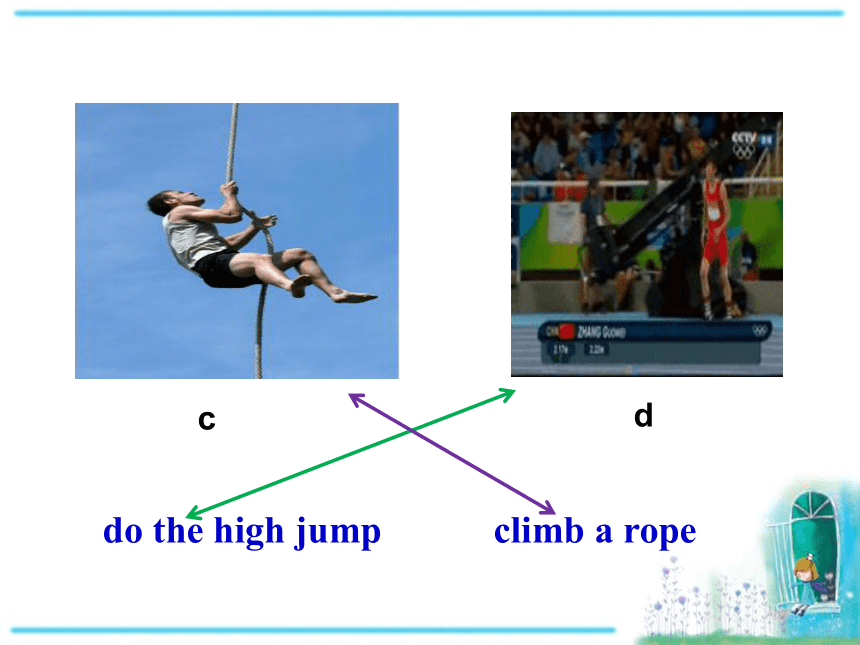
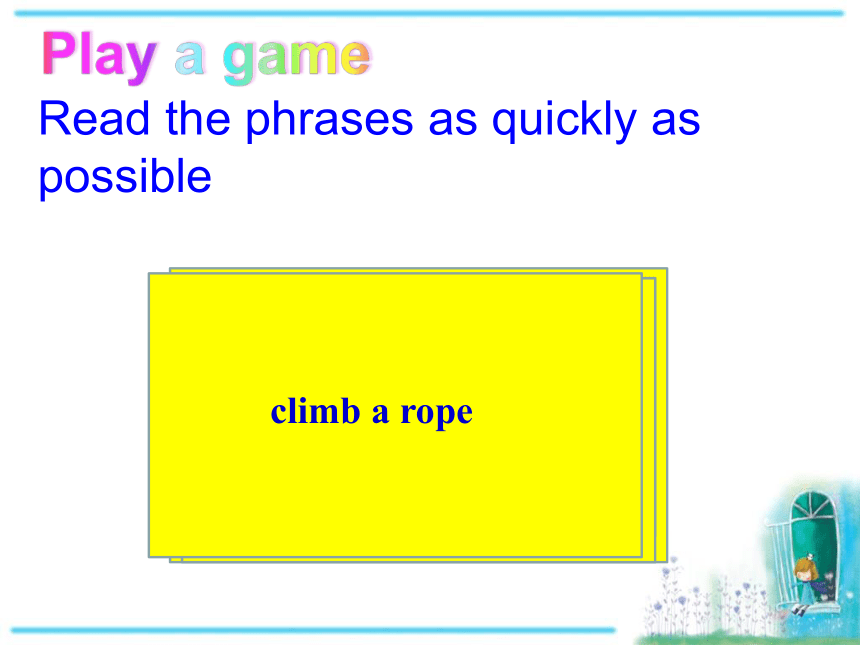
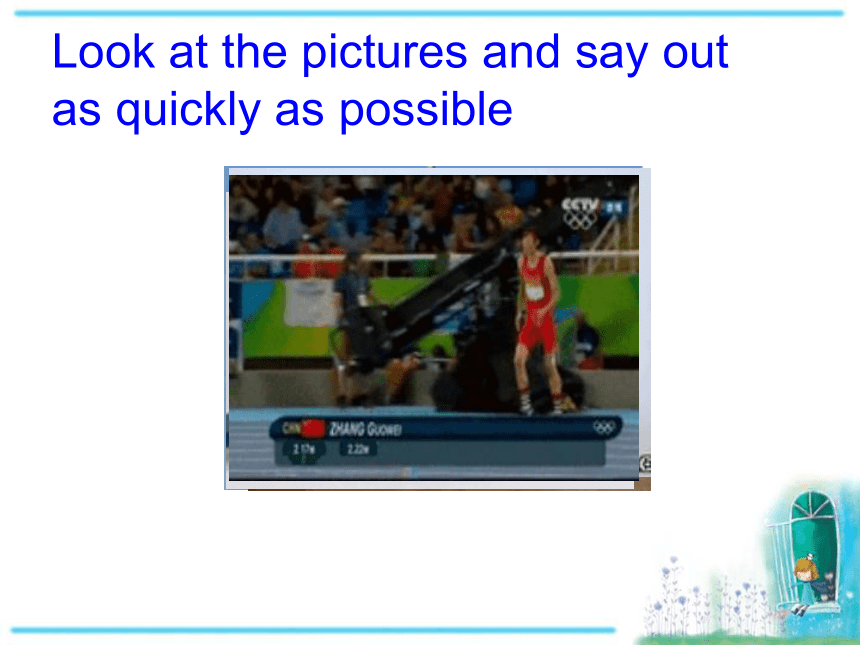
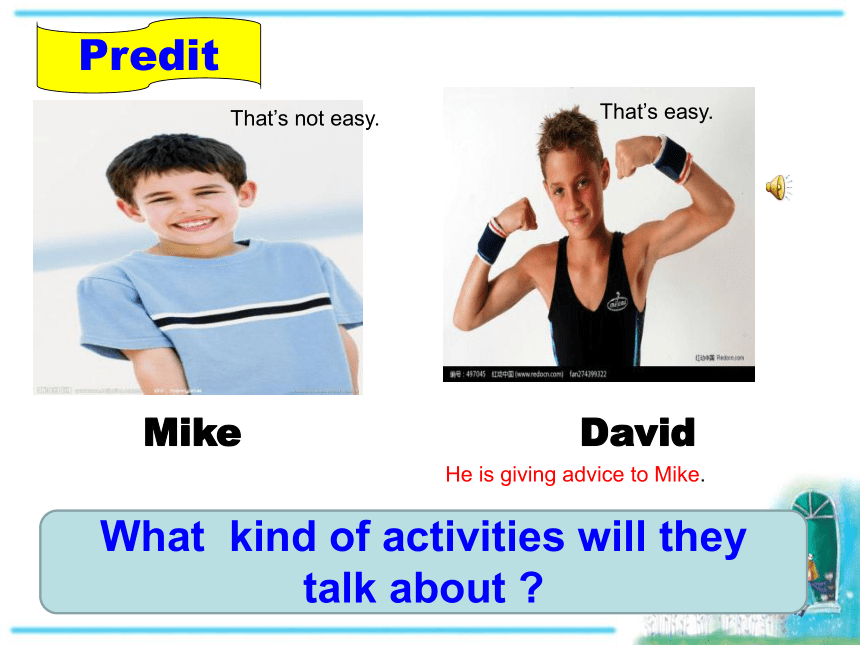
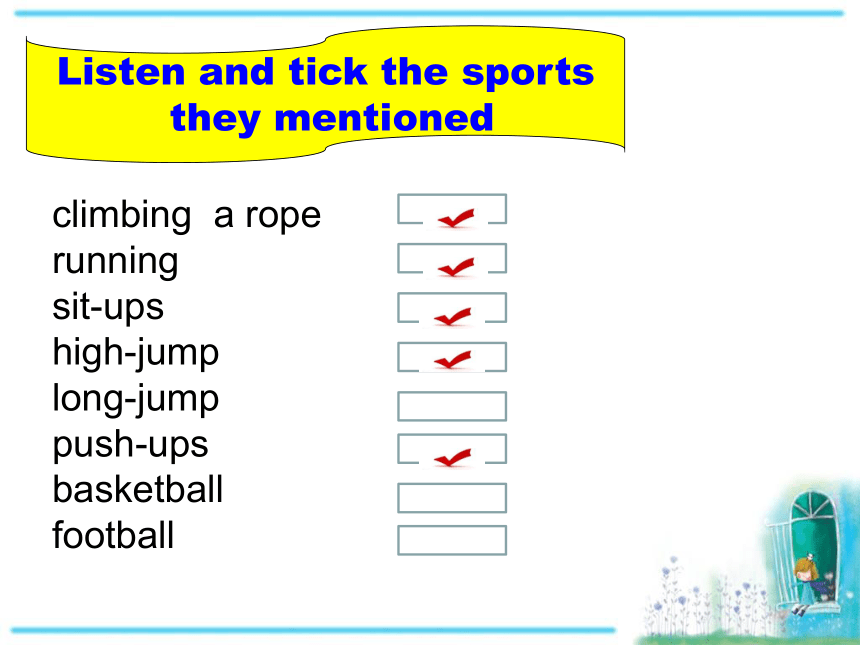

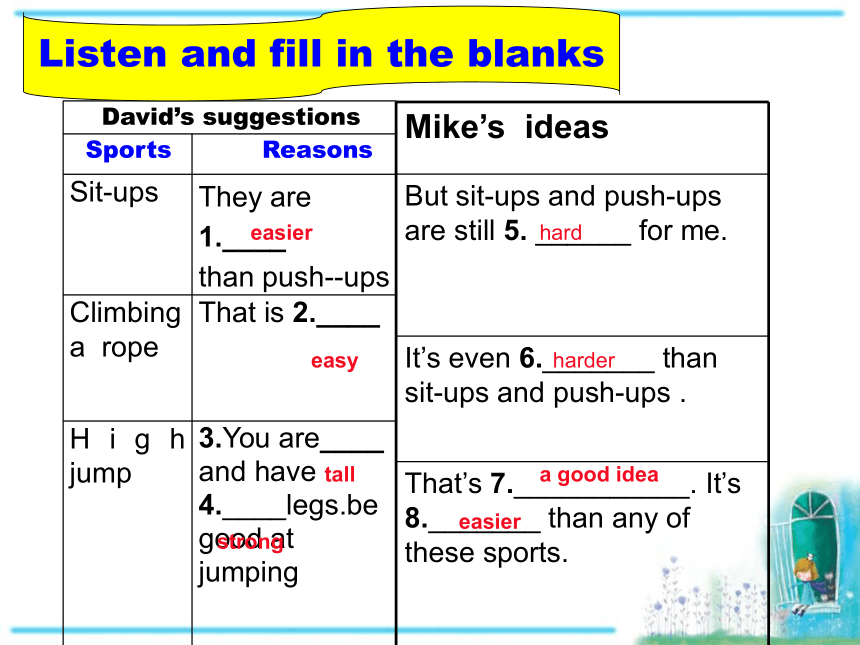
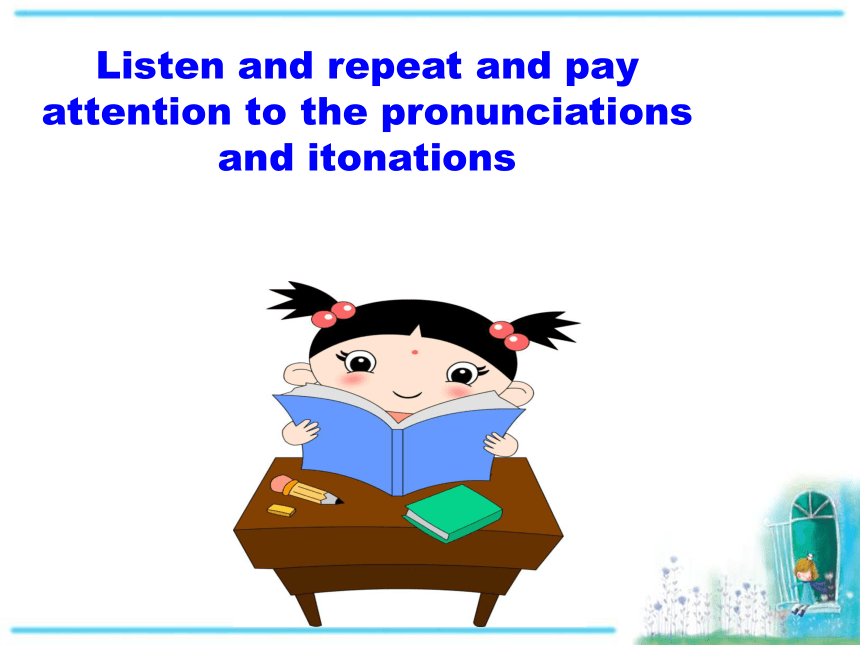
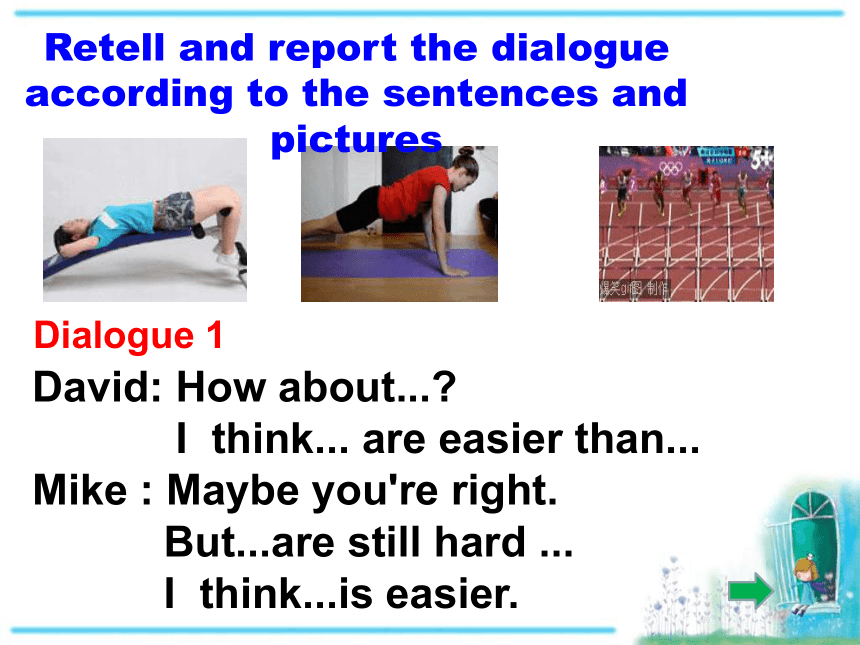
文档简介
课件32张PPT。 Lesson 7
Time to Exercise北师大版《初中英语》八年级上册
Unit 3
Faster, Higher, Strongersportsfootballbasketballtable tennistennisswimmingrunningvolleyballbaseballBrainstormdo the long jump do push – upsdo sit – upsMatchabcdo the high jumpclimb a ropecdRead the phrases as quickly as possiblePlay a gameLook at the pictures and say out as quickly as possiblePreditDavidMikeWhat kind of activities will they
talk about ?PreditThat’s easy.That’s not easy.He is giving advice to Mike. climbing a rope
running
sit-ups
high-jump
long-jump
push-ups
basketball
footballListen and tick the sports
they mentionedListen and chooseF. run a raceB.the long jumpC.sit-ups
D.push-upsE.climb a ropeDavid( )A.the high jumpMike ( )FADavid: Oh,yeah.Last week, I was faster than any other student! I want to break the record this year. How about you?Mike:That’s a good idea.It's easier than any of
these sports.I can jump higher than that
table.Look.
David:Really?
Mike: Yeah.Tables can't jump.
What after- class activities are they
going to take? Listen and fill in the blankseasierhardeasyhardertallstronga good ideaeasierListen and repeat and pay attention to the pronunciations and itonationsDavid: How about...?
I think... are easier than...
Mike : Maybe you're right.
But...are still hard ...
I think...is easier.Dialogue 1Retell and report the dialogue according to the sentences and picturesReport one dialogueExample David and Mike are talking about sit-ups. David thinks...easier than... But Mike says...hard for him.And he thinks...easier.
David: How about sit-ups?
I think they are easier than push-ups.
Mike : Maybe you're right.
But sit-ups are still hard for me.
I think running is easier.David: What about...? ...easy.
Mike : ...is harder than...It’s easy for
you because you have... I always
give up half way through.Dialogue 2David: What about...? ...tall and you
have...You are good at jumping.
Mike: That’s...It’s...any of….I can …
higher than....Dialogue 3David: OK, what about climbing a rope? That’s easy.
Mike: It’s even harder than sit-ups and push-ups! It’s easy for you because you have stronger arms and larger hands. I always give up half way through.
David: OK, what about the high jump? You’re tall and you have strong legs. You’re very good at jumping!
Mike: That’s a good idea! It’s easier than any of these sports. I can jump higher than that table. Look.
David: Really?
Mike: Yeah. Tables can’t jump.
Narrator: It’s time for after-class sports activities. Mike and David are discussing what they are going to do this week.
Mike: Hey, David! Are you going to run this week?
David: Oh, yeah. Last week, I was faster than any other student! I want to break the record this year. How about you?
Mike: I’m not very good at running. I felt a bit sick after the first race,remember?
David: How about sit-ups?
I think they’re easier than push-ups.
Mike: Well, maybe you’re right, but sit-ups and push-ups are still hard for me. I think running is easier.
A: Hi, Peter. The sports meeting is soon. Which sports do you want to take part in?
B: Er… I have no idea.
A: How about running? I think It’s easy for you.
B: Oh, no. I think high jump is easier than running. Because I am tall and I have strong legs.Example Do a surveyReport your surveyExample Our school sports meeting is coming.
I interviewed my group members. Tom
thought…because….But Lily thought…学生评价Evaluation1. Read the dialogue fluently.
2. Make a poster: introduce group members'
sports and reasons according to the survey. Homework
Do you like Mike or David? Why?
内容分析 本课北师大版八年级上册第三单元第七课,本单元话题是,本课的标题是,是一节听说课。主要内容是和两人讨论本周所要选择的课外活动及原因,但是不擅长运动,所以对话是在的不断建议和在不断否定的过程中进行的。期间涉及了语法现象是单音节和双音节形容词与副词的比较级,所涉及的功能句是提建议和表达观点的句型。听力材料篇幅较长,且说话者均为男生,所以不容易辨别说话者的身份。 本课为第一课时,授课重点是获取和两个人本周要做的课外活动及原因,运用提建议和表达观点的句型根据图片表演两个人要参加的课外体育运动和原因的对话。第二节为语法课,进一步学习形容词和副词比较级的用法。听前1、引入:
Exercise means doing sports. Because doing sports can keep us healthy.
由标题导入本课话题,激发学生参与热情
What kind of sports do you know?
头脑风暴。激活已知
2、学习新词汇
词组与图片匹配
做游戏
3、听中
1)听,划出听到的运动名称。
培养抓信息的能力。
2)听,写出要进行的课外活动。
更加明确听力内容。
3) 听,填表格。
培养获取信息能力。听后1、跟读并朗读原文。
2、复述:给图片和词汇,让学生两人一组对话。
关注语言内化。
3、转述对话。中考题型。
4、看句子。小结。
5、做调查。
6、转述对话。
7、让学生评价。
8、让学生思考。听说教学“三部曲”1.Pre-listening(听前):感悟导入。
听前活动要有针对性、趣味性,要能很好地导入听力主题。在听听力材料之前,应该激活文化背景知识,减少学生的听力理解障碍。教师可以选择一些与听力话题相关的材料或参照课本中的插图,或利用多媒体等,开展富有创意的听前活动。来激活学生的思维,使他们产生听的愿望。
2.While-listening(听中):听力练习。
听中活动是听说课的核心部分,教师所设计的活动应该以训练学生的听力技能为目标,视教材为渠道,检测学生对语篇承载的信息的理解能力,培养学生搜集和处理信息的能力,及其用所听信息解决实际问题的能力。
听中又分为三步进行:
第一步:泛听。老师提出与文章相关的几个问题,让学生听材料并找出答案。问题不能太难,确保学生能通过盲听直接找到答案,使学生马上感到听有所获,增强学生的自信心。
第二步:精听。精听是用于训练学生抓住材料中某些细节意思,以及未直接说出的言外之意的能力。其目的是对听力材料作深入、透彻的了解,包括细节内容,从而对文中的内容作出合乎逻辑的推理判断。精听时若遇到生词,要根据上下文的意思、背景知识以及利用构词规则来进行猜测。精听训练中,应当注意的是,要指导学生运用适当的听力技巧搜索、确定信息,找出答案,解决问题。新目标英语中的听力训练形式多样,如:听力填表、人名或图片与活动相匹配、听力排序等等。
第三步:跟读。听力练习后,学生理解了听力材料的内容,在此基础上让学生听音跟读,注意模仿语音、语调,对于不准确的发音要给予纠正。这样进一步巩固了本课的目标语言,为后面要完成的口语任务打好基础。3.Post-listening(听后):学以致用
说的前提之一是听。说的能力在很大程度上有赖于对听的理解能力。听与说是不可分割的整体,只有听懂了,才能接着说。听后,其实就是一个知识输出的过程,教师可以设计一些交际性的活动。这样既能巩固本节课所学知识,又有利于学生创新精神和实践能力的培养,有利于学生交际能力的形成。
学生听说能力的培养是一个日积月累的训练过程,决不是一节课,一个学期就能完成的。我们必须以新课改理念为指导,坚持使用英语教学,多给学生创设一定的练习情境,让学生快乐地学习,从而真正地提高听说水平,提高英语综合能力,推动整个教学改革不断地向前发展。
Unit 3
Faster, Higher, Strongersportsfootballbasketballtable tennistennisswimmingrunningvolleyballbaseballBrainstormdo the long jump do push – upsdo sit – upsMatchabcdo the high jumpclimb a ropecdRead the phrases as quickly as possiblePlay a gameLook at the pictures and say out as quickly as possiblePreditDavidMikeWhat kind of activities will they
talk about ?PreditThat’s easy.That’s not easy.He is giving advice to Mike. climbing a rope
running
sit-ups
high-jump
long-jump
push-ups
basketball
footballListen and tick the sports
they mentionedListen and chooseF. run a raceB.the long jumpC.sit-ups
D.push-upsE.climb a ropeDavid( )A.the high jumpMike ( )FADavid: Oh,yeah.Last week, I was faster than any other student! I want to break the record this year. How about you?Mike:That’s a good idea.It's easier than any of
these sports.I can jump higher than that
table.Look.
David:Really?
Mike: Yeah.Tables can't jump.
What after- class activities are they
going to take? Listen and fill in the blankseasierhardeasyhardertallstronga good ideaeasierListen and repeat and pay attention to the pronunciations and itonationsDavid: How about...?
I think... are easier than...
Mike : Maybe you're right.
But...are still hard ...
I think...is easier.Dialogue 1Retell and report the dialogue according to the sentences and picturesReport one dialogueExample David and Mike are talking about sit-ups. David thinks...easier than... But Mike says...hard for him.And he thinks...easier.
David: How about sit-ups?
I think they are easier than push-ups.
Mike : Maybe you're right.
But sit-ups are still hard for me.
I think running is easier.David: What about...? ...easy.
Mike : ...is harder than...It’s easy for
you because you have... I always
give up half way through.Dialogue 2David: What about...? ...tall and you
have...You are good at jumping.
Mike: That’s...It’s...any of….I can …
higher than....Dialogue 3David: OK, what about climbing a rope? That’s easy.
Mike: It’s even harder than sit-ups and push-ups! It’s easy for you because you have stronger arms and larger hands. I always give up half way through.
David: OK, what about the high jump? You’re tall and you have strong legs. You’re very good at jumping!
Mike: That’s a good idea! It’s easier than any of these sports. I can jump higher than that table. Look.
David: Really?
Mike: Yeah. Tables can’t jump.
Narrator: It’s time for after-class sports activities. Mike and David are discussing what they are going to do this week.
Mike: Hey, David! Are you going to run this week?
David: Oh, yeah. Last week, I was faster than any other student! I want to break the record this year. How about you?
Mike: I’m not very good at running. I felt a bit sick after the first race,remember?
David: How about sit-ups?
I think they’re easier than push-ups.
Mike: Well, maybe you’re right, but sit-ups and push-ups are still hard for me. I think running is easier.
A: Hi, Peter. The sports meeting is soon. Which sports do you want to take part in?
B: Er… I have no idea.
A: How about running? I think It’s easy for you.
B: Oh, no. I think high jump is easier than running. Because I am tall and I have strong legs.Example Do a surveyReport your surveyExample Our school sports meeting is coming.
I interviewed my group members. Tom
thought…because….But Lily thought…学生评价Evaluation1. Read the dialogue fluently.
2. Make a poster: introduce group members'
sports and reasons according to the survey. Homework
Do you like Mike or David? Why?
内容分析 本课北师大版八年级上册第三单元第七课,本单元话题是,本课的标题是,是一节听说课。主要内容是和两人讨论本周所要选择的课外活动及原因,但是不擅长运动,所以对话是在的不断建议和在不断否定的过程中进行的。期间涉及了语法现象是单音节和双音节形容词与副词的比较级,所涉及的功能句是提建议和表达观点的句型。听力材料篇幅较长,且说话者均为男生,所以不容易辨别说话者的身份。 本课为第一课时,授课重点是获取和两个人本周要做的课外活动及原因,运用提建议和表达观点的句型根据图片表演两个人要参加的课外体育运动和原因的对话。第二节为语法课,进一步学习形容词和副词比较级的用法。听前1、引入:
Exercise means doing sports. Because doing sports can keep us healthy.
由标题导入本课话题,激发学生参与热情
What kind of sports do you know?
头脑风暴。激活已知
2、学习新词汇
词组与图片匹配
做游戏
3、听中
1)听,划出听到的运动名称。
培养抓信息的能力。
2)听,写出要进行的课外活动。
更加明确听力内容。
3) 听,填表格。
培养获取信息能力。听后1、跟读并朗读原文。
2、复述:给图片和词汇,让学生两人一组对话。
关注语言内化。
3、转述对话。中考题型。
4、看句子。小结。
5、做调查。
6、转述对话。
7、让学生评价。
8、让学生思考。听说教学“三部曲”1.Pre-listening(听前):感悟导入。
听前活动要有针对性、趣味性,要能很好地导入听力主题。在听听力材料之前,应该激活文化背景知识,减少学生的听力理解障碍。教师可以选择一些与听力话题相关的材料或参照课本中的插图,或利用多媒体等,开展富有创意的听前活动。来激活学生的思维,使他们产生听的愿望。
2.While-listening(听中):听力练习。
听中活动是听说课的核心部分,教师所设计的活动应该以训练学生的听力技能为目标,视教材为渠道,检测学生对语篇承载的信息的理解能力,培养学生搜集和处理信息的能力,及其用所听信息解决实际问题的能力。
听中又分为三步进行:
第一步:泛听。老师提出与文章相关的几个问题,让学生听材料并找出答案。问题不能太难,确保学生能通过盲听直接找到答案,使学生马上感到听有所获,增强学生的自信心。
第二步:精听。精听是用于训练学生抓住材料中某些细节意思,以及未直接说出的言外之意的能力。其目的是对听力材料作深入、透彻的了解,包括细节内容,从而对文中的内容作出合乎逻辑的推理判断。精听时若遇到生词,要根据上下文的意思、背景知识以及利用构词规则来进行猜测。精听训练中,应当注意的是,要指导学生运用适当的听力技巧搜索、确定信息,找出答案,解决问题。新目标英语中的听力训练形式多样,如:听力填表、人名或图片与活动相匹配、听力排序等等。
第三步:跟读。听力练习后,学生理解了听力材料的内容,在此基础上让学生听音跟读,注意模仿语音、语调,对于不准确的发音要给予纠正。这样进一步巩固了本课的目标语言,为后面要完成的口语任务打好基础。3.Post-listening(听后):学以致用
说的前提之一是听。说的能力在很大程度上有赖于对听的理解能力。听与说是不可分割的整体,只有听懂了,才能接着说。听后,其实就是一个知识输出的过程,教师可以设计一些交际性的活动。这样既能巩固本节课所学知识,又有利于学生创新精神和实践能力的培养,有利于学生交际能力的形成。
学生听说能力的培养是一个日积月累的训练过程,决不是一节课,一个学期就能完成的。我们必须以新课改理念为指导,坚持使用英语教学,多给学生创设一定的练习情境,让学生快乐地学习,从而真正地提高听说水平,提高英语综合能力,推动整个教学改革不断地向前发展。
同课章节目录
- Unit 1 Television
- Lesson 1 Last Week on TV
- Lesson 2 An Interview on TV
- Lesson 3 The Big Game
- Communication Workshop
- Unit 2 Teams
- Lesson 4 Class Projects
- Lesson 5 Teamwork
- Lesson 6 A Special Team
- Communication Workshop
- Unit 3 Faster,Higher,Stronge
- Lesson 7 Time to Exercise
- Lesson 8 Olympic Winners
- Lesson 9 Never Give Up!
- Communication Workshop
- Unit 4 Healthy Living
- Lesson 10 Going to the Doctor
- Lesson 11 Health Advice
- Lesson 12 Healthy Bones
- Communication Workshop
- Unit 5 Helping
- Lesson 13 Helping Your Community
- Lesson 14 Helping Each Other
- Lesson 15 A Young Hero
- Communication Workshop
- Unit 6 The Unexplained
- Lesson 16 Natural Abilities
- Lesson 17 True Stories?
- Lesson 18 Dreams
- Communication Workshop
